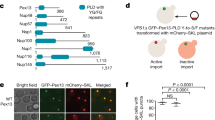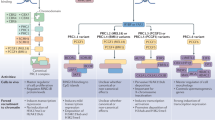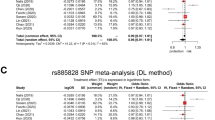Abstract
Mutations in the PEX7 gene encoding a peroxisome targeting signal 2 (PTS2) were identified in two patients with rhizomelic chondrodysplasia punctata (RCDP). A 7-year-old girl, the first Japanese individual to be diagnosed biochemically as a case of RCDP, had a novel nonsense mutation, R232ter, in the PEX7 gene, which had been inherited from her consanguineous parents. Another patient, a Chilean boy with RCDP, had compound heterozygous mutations of PEX7, L292ter and A218V, both of which have been documented. R232ter, which deletes all of the last two WP40 repeats in the PEX7 gene, is sufficient to inactivate functions of the PEX7 gene.
Similar content being viewed by others
Log in or create a free account to read this content
Gain free access to this article, as well as selected content from this journal and more on nature.com
or
Author information
Authors and Affiliations
Additional information
Received: October 16, 1998 / Accepted November 11, 1998
Rights and permissions
About this article
Cite this article
Shimozawa, N., Suzuki, Y., Zhang, Z. et al. A novel nonsense mutation of the PEX7 gene in a patient with rhizomelic chondrodysplasia punctata. J Hum Genet 44, 123–125 (1999). https://doi.org/10.1007/s100380050123
Published:
Issue date:
DOI: https://doi.org/10.1007/s100380050123



